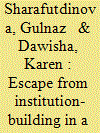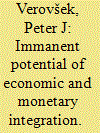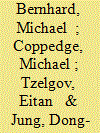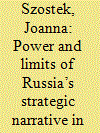|
|
|
Sort Order |
|
|
|
Items / Page
|
|
|
|
|
|
|
| Srl | Item |
| 1 |
ID:
153927


|
|
|
| 2 |
ID:
153930


|
|
|
|
|
| Summary/Abstract |
Strong institutions and accountable governments are imperative for any country’s long-term prosperity. Yet the development of such institutions has presented a continuous challenge for many countries around the world. Using Russia as a case, this study brings attention to the unexpected negative impact of global interdependence and shows that institutional arbitrage opportunities have enabled economic actors to solve for institutional weaknesses and constraints in the domestic realm by using foreign institutions, thereby limiting the emergence of a domestic rule of law regime. We argue that such opportunities lower the propensity of asset-holders, normally interested in strong institutions at home, to organize collective action to lobby for better institutions. We demonstrate the main ways through which Russia’s capital-owners make use of foreign legal and financial infrastructures such as capital flight, the use of foreign corporate structures, offshore financial centers, real estate markets, the round-tripping of foreign direct investment, and reliance on foreign law in contract-writing and foreign courts in dispute-resolution.
|
|
|
|
|
|
|
|
|
|
|
|
|
|
|
|
| 3 |
ID:
153928


|
|
|
|
|
| Summary/Abstract |
The twenty-fifth anniversary of the collapse of the USSR naturally provokes us to reflect on the course of Eurasian and world history in the post-communist era. Upon closer examination, however, it is not clear what significance the precise time span of two and a half decades has for the scientific study of political and institutional change. A review of the social science literature indicates that we are very far from having any consensual understanding of how long processes of regime evolution typically take—and thus, how to establish the relevant time span for judging the scientific accuracy of initial predictions about the outcomes of post-communist “transitions.” I argue that the first step in assessing the lessons of post-Soviet political change to date, from a social-scientific point of view, lies in defining the term “regime” more precisely, so that scholars can at least agree when one regime has ended and another begun. In this respect, Weberian sociological theory provides useful conceptual materials for a more general theory of “regime evolution” within which the empirical results of the first twenty-five years of post-Soviet change can be situated.
|
|
|
|
|
|
|
|
|
|
|
|
|
|
|
|
| 4 |
ID:
153932


|
|
|
|
|
| Summary/Abstract |
The Eurozone crisis revealed fundamental flaws in the institutional architecture of the Economic and Monetary Union. Its lack of political steering capacity has demonstrated the need for a broad but seemingly unachievable political union with shared economic governance and a common treasury. Agreement on further measures has been difficult to achieve, as different actors have imposed divergent external criteria for the success of the Eurozone. As part of their heritage in Western Marxism, the critical theorists of the Frankfurt School sought to overcome such problems by identifying internal standards for social criticism. Building on their understanding of immanent critique, I argue that the Eurozone already contains the normative principles necessary to support greater political integration. While the citizens of Europe must provide the democratic legitimation necessary to realize this latent potential, the flaws revealed by the crisis are already pushing Europe towards greater transnational solidarity.
|
|
|
|
|
|
|
|
|
|
|
|
|
|
|
|
| 5 |
ID:
153929


|
|
|
|
|
| Summary/Abstract |
We show how the V-Dem data opens new possibilities for studying civil society in comparative politics. We explain how V-Dem was able to extract embedded expert knowledge to create a novel set of civil society indicators for 173 countries from 1900 to the present. This data overcomes shortcomings in the basis on which inference has been made about civil society in the past by avoiding problems of sample bias that make generalization difficult or tentative. We begin with a discussion of the reemergence of civil society as a central concept in comparative politics. We then turn to the shortcomings of the existing data and discusses how the V-Dem data can overcome them. We introduce the new data, highlighting two new indices—the core civil society index (CCSI) and the civil society participation index (CSPI)—and explain how the individual indicators and the indices were created. We then demonstrate how the CCSI uses embedded expert knowledge to capture the development of civil society on the national level in Venezuela, Ghana, and Russia. We close by using the new indices to examine the dispute over whether post-communist civil society is “weak.” Time-series cross-sectional analysis using 2,999 country-year observations between 1989 and 2012 fails to find that post-communist civil society is substantially different from other regions, but that there are major differences between the post-Soviet subsample and other post-communist countries both in relation to other regions and each other.
|
|
|
|
|
|
|
|
|
|
|
|
|
|
|
|
| 6 |
ID:
153933


|
|
|
|
|
| Summary/Abstract |
The 2008 financial crisis hit few places harder than the Euro periphery. Faced with high levels of public debt, Portugal, Italy, Ireland, Greece, and Spain were each compelled to implement harsh austerity reforms. Yet despite this common policy response, the recoveries have shown significant divergence. In particular, Ireland seems to have managed to succeed economically in a way that the other peripheral countries have not. The prevailing narrative is that Ireland’s recovery from the crisis is due to “austerity” and improved “cost competitiveness.” Drawing upon theories from the study of comparative capitalism we challenge this narrative, and argue that the Irish recovery is an outcome of a state-led enterprise policy aimed at nurturing a close relationship with corporate firms from Silicon Valley. Using qualitative and quantitative investigation we find evidence that this state-led FDI growth model, rather than austerity induced competitiveness, kick-started Ireland’s recovery from crisis. As Ireland is a critical case for the “success” story of austerity in Europe, our findings represent a significant challenge to the politics of adjustment. It suggests the strategies of business-state elites, and not simply the workings of electoral coalitions, explains the politics of adjustment in advanced capitalism.
|
|
|
|
|
|
|
|
|
|
|
|
|
|
|
|
| 7 |
ID:
153931


|
|
|
|
|
| Summary/Abstract |
Governments project strategic narratives about international affairs, hoping thereby to shape the perceptions and behaviour of foreign audiences. If individuals encounter incompatible narratives projected by different states, how can their acceptance of one narrative over another be explained? I suggest that support for the strategic narrative of a foreign government is more likely when there is social and communicative linkage at the individual level, i.e., when an individual maintains personal and cultural connections to the foreign state through regular travel, media consumption, religious attendance, and conversations with friends or relatives. The role of linkage is demonstrated in Ukraine, where a “pro-Russian, anti-Western” narrative projected from Moscow has been competing against a “pro-Western, anti-Russian” narrative projected from Kyiv. Previous accounts of international persuasion have been framed in terms of a state’s resources producing advantageous “soft power.” However, I propose a shift in focus—from the resources states have to what individuals do to maintain social and communicative ties via which ideas cross borders. In a competitive discursive environment such linkage can in fact have mixed consequences for the states involved, as the Ukrainian case illustrates.
|
|
|
|
|
|
|
|
|
|
|
|
|
|
|
|
|
|
|
|
|